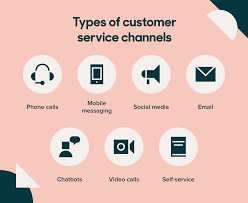The Importance of Implementing a CRM Project
In today’s competitive business landscape, maintaining strong relationships with customers is crucial for success. This is where Customer Relationship Management (CRM) systems play a vital role. A CRM project involves the implementation of software and strategies to effectively manage interactions with current and potential customers.
Benefits of a CRM Project:
- Improved Customer Relationships: By centralizing customer data and interactions, a CRM system enables businesses to better understand their customers’ needs and preferences.
- Increased Efficiency: Automation of tasks such as lead management, sales tracking, and customer support can streamline processes and save time.
- Enhanced Sales Performance: With access to real-time data and analytics, sales teams can identify opportunities, prioritize leads, and close deals more effectively.
- Better Marketing Campaigns: Targeted marketing campaigns can be created based on customer segmentation and behavior analysis provided by the CRM system.
- Improved Customer Service: Quick access to customer information allows for personalized interactions and faster issue resolution.
Key Considerations for a Successful CRM Project:
- Clear Objectives: Define specific goals for the CRM project, such as increasing sales revenue, improving customer retention rates, or enhancing cross-selling opportunities.
- User Training: Provide comprehensive training to ensure that employees understand how to use the CRM system effectively.
- Data Security: Implement robust security measures to protect sensitive customer information stored in the CRM database.
- Integration with Existing Systems: Ensure seamless integration with other business applications to maximize efficiency and data consistency.
- Ongoing Support and Maintenance: Regularly update the CRM system and provide support to address any issues or changes in business requirements.
In conclusion, investing in a CRM project can lead to significant benefits for businesses looking to enhance customer relationships, drive sales growth, and improve overall operational efficiency. By carefully planning and executing a CRM implementation strategy, organizations can gain a competitive edge in today’s dynamic marketplace.
6 Essential Tips for a Successful CRM Project Implementation
- Clearly define project goals and objectives.
- Involve key stakeholders from different departments in the planning process.
- Choose a CRM system that aligns with your business needs and budget.
- Provide adequate training for users to ensure successful adoption of the CRM system.
- Regularly review and update data to maintain data accuracy and relevance.
- Monitor key performance indicators to track the success of the CRM project.
Clearly define project goals and objectives.
In a Customer Relationship Management (CRM) project, it is essential to clearly define project goals and objectives. By establishing specific and measurable targets, such as increasing customer retention rates or improving sales efficiency, organizations can align their efforts towards achieving desired outcomes. Clear project goals provide a roadmap for the implementation process, guiding decision-making and resource allocation to ensure that the CRM system effectively addresses the needs of the business and its customers.
Involve key stakeholders from different departments in the planning process.
To ensure the success of a CRM project, it is essential to involve key stakeholders from different departments in the planning process. By engaging representatives from sales, marketing, customer service, and IT teams, organizations can gain valuable insights into the specific needs and requirements of each department. This collaborative approach helps align the CRM project with the overall business objectives and ensures that the system is tailored to meet the diverse needs of all stakeholders. Effective communication and collaboration among key departments during the planning phase can lead to a more successful implementation and adoption of the CRM system across the organization.
Choose a CRM system that aligns with your business needs and budget.
When embarking on a CRM project, it is essential to select a CRM system that aligns closely with your business requirements and financial constraints. By choosing a CRM solution that is tailored to your specific needs and budget, you can ensure a more seamless implementation process and maximize the return on your investment. It is crucial to assess factors such as scalability, customization options, integration capabilities, and ongoing support to select a CRM system that will effectively support your business objectives while staying within budgetary constraints.
Provide adequate training for users to ensure successful adoption of the CRM system.
Providing adequate training for users is a crucial tip for the successful adoption of a CRM system. By ensuring that employees have the necessary knowledge and skills to effectively utilize the CRM software, businesses can maximize the system’s benefits and drive user engagement. Training sessions can empower users to navigate the system efficiently, input data accurately, and leverage its features to enhance customer interactions. Investing in comprehensive training not only boosts user confidence but also promotes a culture of continuous learning and improvement within the organization.
Regularly review and update data to maintain data accuracy and relevance.
Regularly reviewing and updating data is a critical tip for a successful CRM project. By ensuring that the information stored in the system is accurate and up-to-date, businesses can maintain the relevance of their customer insights and interactions. This practice not only enhances the effectiveness of marketing campaigns and sales strategies but also helps in providing personalized customer experiences. Keeping data accuracy at the forefront of CRM management allows organizations to make informed decisions based on reliable information, ultimately leading to improved customer relationships and business success.
Monitor key performance indicators to track the success of the CRM project.
Monitoring key performance indicators (KPIs) is essential to track the success of a CRM project. By regularly assessing metrics such as customer acquisition rates, lead conversion rates, customer satisfaction scores, and sales revenue generated through the CRM system, businesses can gain valuable insights into the effectiveness of their CRM strategy. Analyzing KPIs allows organizations to identify areas for improvement, make data-driven decisions, and ensure that the CRM project is aligned with business objectives.




